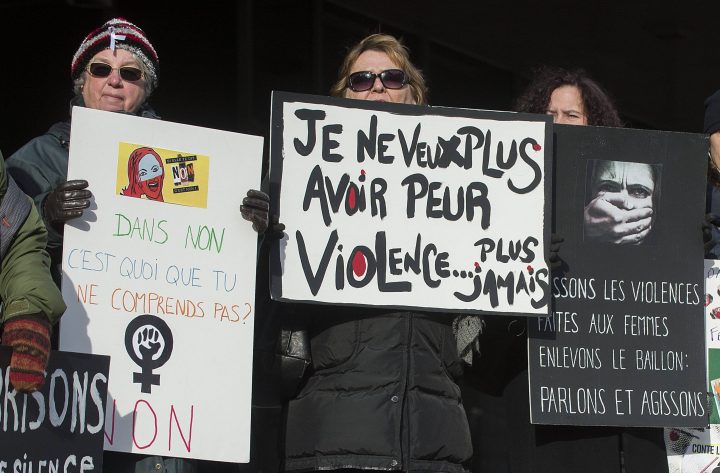“Do you know why you are there?” Marc Lépine asked the women at the beginning of what would become the École Polytechnique massacre. He had separated the women from the men, telling the latter to leave the room.

“No,” one woman replied.
“I am fighting feminism,” he said.
“We are not feminists. I have never fought against men,” the same woman told him.
Lépine began to shoot.
By the end of the day, he had killed 14 women: Geneviève Bergeron, Hélène Colgan, Nathalie Croteau, Barbara Daigneault, Anne-Marie Edward, Maud Haviernick, Barbara Klucznik-Widajewicz, Maryse Laganière, Maryse Leclair, Anne-Marie Lemay, Sonia Pelletier, Michèle Richard, Annie St-Arneault and Annie Turcotte.
This Dec. 6 marks 30 years since his attack. Every year, our country mourns, and every year, we agree: “We cannot forget.”

Get daily National news
But in the nearly three decades since, women continue to be harassed, assaulted and killed in Canada.
Approaching the anniversary of the attack at École Polytechnique, a group of reporters at Global News reflected on how we must provide better, more consistent and nuanced coverage of any woman, trans or non-binary person who has experienced violence, abuse or harassment if we are to play a role in eradicating it. We set out to create Broken, a news project we believe Canada needs.
This series will address issues that contribute to and exacerbate violence against women:
- Maham Abedi and Jasmine Pazzano will explore the underfunding of women’s shelters.
- Leslie Young will crunch the data: how have the numbers shifted? How are women dying? Who is killing them?
- Meghan Collie will look at what the next generation is being taught about violence against women, feminism and equality.
- Laura Hensley will dive into women’s experiences reporting sexual harassment in the workplace.
- Jane Gerster will look at how the public conversation about feminism has shifted from 1989 until now.
- Aalia Adam will look back at the massacre, exploring lessons learned and forgotten.
- Arti Patel and Alley Wilson will explore the culture shift that’s prompting more women of colour to feel comfortable speaking up about the violence they experience.
- Maryam Shah and Maham Abedi will focus on violence against Indigenous women, six months after the National Inquiry into Missing and Murdered Indigenous Women and Girls released its final report.
- Jon Azpiri will speak to men who have abused: why did they do it, and how can we successfully rehabilitate them?
- Rachael D’Amore will look at the violence and vitriol facing trans people in Canada.
- Erica Alini will break down the costs of violence against women, in particular, the ways in which financial abuse is — and isn’t — being addressed.
- Amanda Connolly will look to the future: what’s changing federally in the fight for women’s equality in 2020?
How much has actually changed since the horrific day Lépine gunned down 14 women? Our series starts by revisiting the past — can you tell from newspaper headlines alone which issues of violence women were grappling with in 1989 versus 2019? Broken‘s official launch is Monday, Nov. 25, the International Day for the Elimination of Violence Against Women. Stories will publish every few days. Every time we publish, we will update this page. Please follow along.
Violence against women may not have captured much attention during the federal election, but many, including Lise Martin from Women’s Shelters Canada, said it should have — and that recognizing that women’s rights matter is no longer enough.
“The situation for women who are living in violence hasn’t changed in the last four years, and it hasn’t changed in decades.”
Arti.Patel@globalnews.ca
Jane.Gerster@globalnews.ca
Maham.Abedi@globalnews.ca









Comments
Want to discuss? Please read our Commenting Policy first.